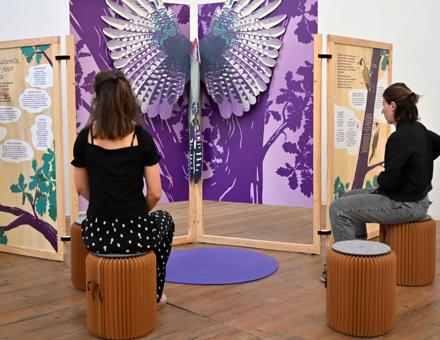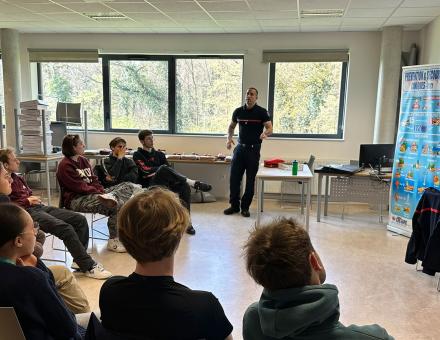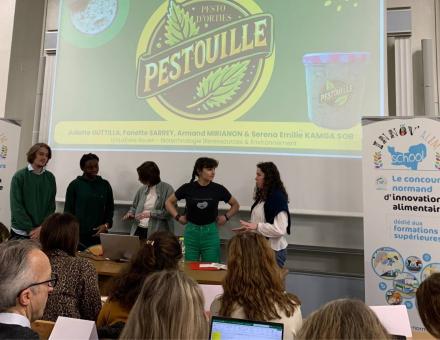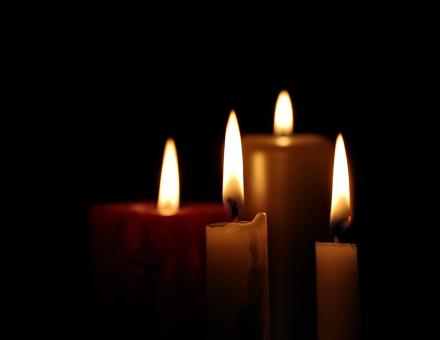Charlotte Saux, Eloi Huet and Etienne Chambon, engineering students at UniLaSalle Beauvais, have won the world final of the Imperial Barrel Award!
It wasn't an easy challenge, but they rose to it with flying colors! Charlotte Saux, Eloi Huet and Etienne Chambon, all three 5th-year engineering students in Geosciences & Environment (Geo-Energies, Climatic Risks and Territories course) at UniLaSalle Beauvais, won the world final of the Imperial Barrel Award after brilliantly qualifying at the end of the “Europe” zone final.
The Lasallian team was competing in the “Geothermal” category, a new feature of the 2024 edition of the IBA, an international team competition for geology students organized by the AAPG (American Association of Petroleum Geoscientists).
Although the Irish Sea study area gave them a hard time (the geological characteristics and offshore location are not very favorable to geothermal energy), our three students were bold enough to propose an on-site use of this low geothermal potential for a carbon capture and storage project. An analysis outside their comfort zone that earned them a shower of congratulations from the jury, reputed to be particularly fastidious.
The team also devoted a significant part of their presentation to the environment, mobilizing three sustainable development goals as defined by the United Nations:
- Clean and affordable energy (Goal 7)
- Aquatic life (Goal 14)
- Partnerships to achieve the goals (goal 17)
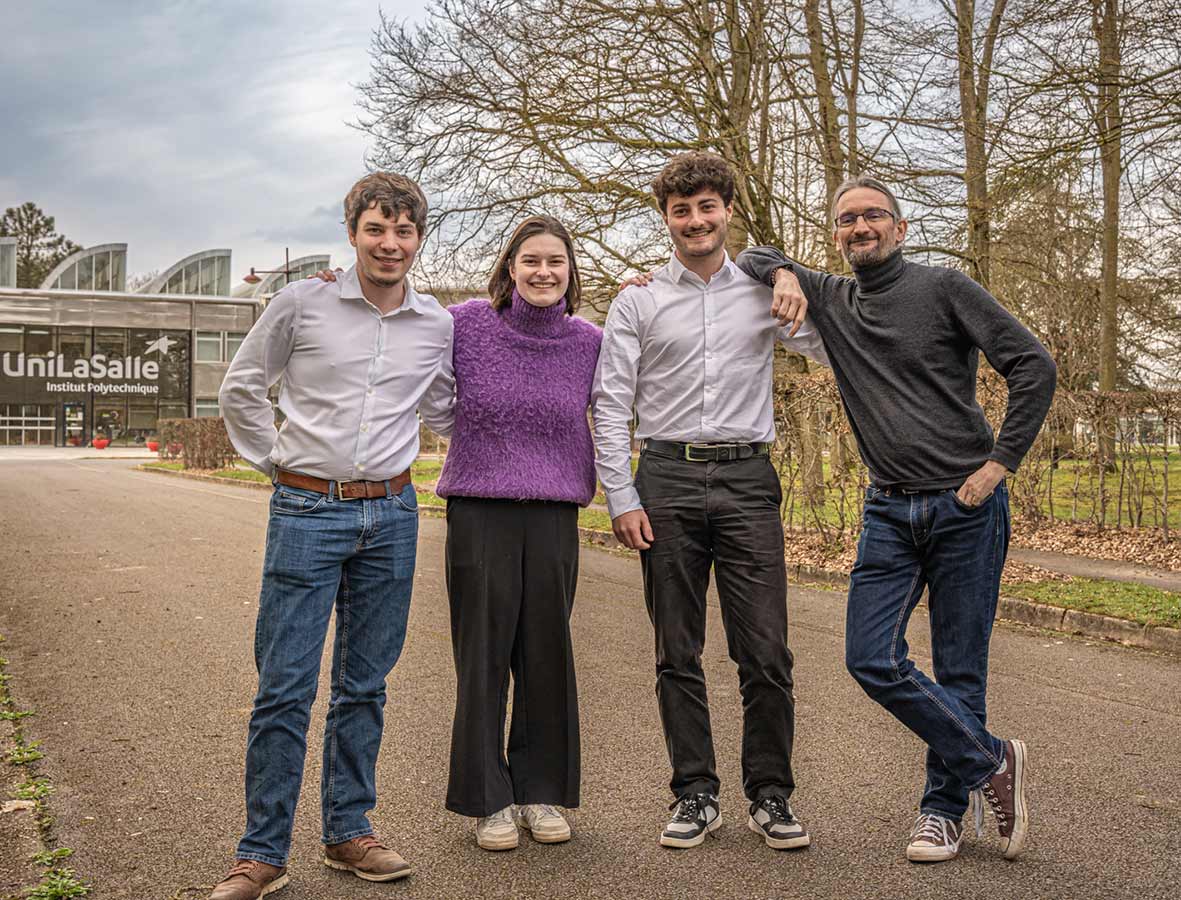
Etienne Chambon's account of the European final
"We received the data set for the IBAs in mid-January, ahead of schedule... so we had to start work 2 weeks late, as we had to finish our semester.
Second surprise: our data (seismic and wells) are located in the “East Irish Sea Basin” in the Irish Sea, some thirty kilometers off the coast of Liverpool. So it's really not an ideal, conventional location for geothermal energy... not only because we're offshore, but also because the area doesn't have the right heat for geothermal energy.
Motivation and morale were therefore really low. It wasn't easy to motivate yourself when you knew that your project wasn't going to lead to much... But we kept going, between bibliography and interpreting the Petrel data. We had three coaches, Marc Blaizot (Member of the Board of Directors of the AVENIA cluster), Christian Boissavy (former President of the French Association of Geothermal Professionals) and Jules Grellier (an alumnus working at TLS in geothermal energy). They themselves were intrigued and pessimistic about our area.
Our strategy at the outset was to show by all possible means that a geothermal project in the area was not relevant, i.e. to explore all possible reservoirs and show why it's not viable.
After several weeks' work, we've come across some interesting leads that could make our project less pessimistic.
Firstly, there is a CO2 capture and storage (CCUS) project in our area, which apparently requires heating the CO2 to 30ºC before injection. Our shallowest reservoir (750m) is at around 30/40ºC, which is insufficient for geothermal energy... It's impossible to generate electricity and bring the heat to the mainland! So we came up with the idea of using this heat directly on site, in “collaboration” with the CCUS project in our area.
Secondly, we've located a deeper reservoir (3 km) in the Carboniferous, which offers much more interesting heat, and could therefore perhaps generate electricity! However, we don't have enough data in the Carboniferous to be sure of its potential. We therefore propose a new acquisition campaign and a new well to be sure.
Our conclusion was therefore based on these 2 reservoirs, and on the objective of collaborating with the CCUS project (which is part of a large-scale project in the UK).
So we came to a nuanced but rather positive conclusion!
The assignment was to produce a PowerPoint presentation in English, which had to meet very precise specifications. We finished just in time and our oral went really well 😎."
8 weeks to analyze the data and prepare their oral presentation
Organized annually by the AAPG, the Imperial Barrel Award is a competition focusing on the analysis and evaluation of the geological potential of underground basins. In teams, geoscience students from universities and schools around the world analyze the same dataset and present their findings in an oral presentation in English.
The best teams from each continent qualify for the world final, held remotely on Friday May 31.
The Imperial Barrel Award: a formative experience
After two months spent on the project, Charlotte, Eloi and Etienne are unanimous: taking part in the Imperial Barrel Award was a highly enriching experience. “We were totally autonomous for 2 months, and it taught us rigor,” explains Charlotte. The student also considers it a real asset for her end-of-studies internship. "We did everything from A to Z, using raw data. We had to go through a lot of software to process it all. The support provided by our coaches and teachers enabled us to make effective progress, while at the same time discovering certain operating modes for ourselves,” she says, noting that she also learned a lot of industry terminology during the exercise.
As for Eloi, he's happy to have chosen the subject of geothermal energy, a challenging topic because it's one that's less frequently covered in his courses. "We learned a lot about geothermal energy, and the IBA project also brought up a lot of geological knowledge. The coaches and lecturers who followed us gave us invaluable information with a great deal of expertise. Beyond the geology aspect, our participation in IBA 2024 also enabled us to progress in project management, oral presentation (we received a lot of advice in this area) and... English!"
UniLaSalle's participation in this prestigious competition enables its geosciences engineering students to compete with students from all over the world. The school is very proud to see its teams regularly achieve at least an honourable place in the European final, but above all, increasingly frequent qualification for the world final. As a reminder, the Lasallian team won the Imperial Barrel Award in 2022, making this the second Lasallian victory in this world-class competition.
UniLaSalle would like to congratulate Charlotte, Eloi and Etienne, as well as Julien Bailleul, a teacher-researcher in sedimentary geology and basin analysis, who supervised them throughout the project.



